Knee High Socks Short Nini Dress Button Up Shirt
Fashion History- The Look of the 1960's
![]()
Written by- Kalyani Kala, Fashion Business Management, ISDI. Faculty- Belinda Bawa

The transition of fashion from one decade to another played itself like a song on repeat. The ruling tenure of trends and brands was going to see a shortening of age and all of this happened in the 1960's. A decade of opposites yet the one that hosted them both. This means that the 1960's was a decade where both- sophisticated designs inspired from the 50's and rather bold and revolting designs of the new generation were equally famous. This makes the 1960's one of the most decade for fashion. This was for the first time that fashion was driven around the youth market and featured a wide number of diversified trends.
The fashion trends in the decade broke many fashion traditions by mirroring socials movements that were making headlines in that period. The ideology of designing for only mature and elite members was let down as the influence and need to cater to the teenage and young adult market was increasingly important. More radically innovative fashion styles, like little girl androgynous looks for women, swept away the ruling likes of the sophisticated sweater girls of the sixties.
1960s fashion was bi-polar in just about every way. Bright, swirling colors. Psychedelic, tie-dye shirts and long hair and beards. Woman wore unbelievably short skirts and men wore tunics and capes. The foray into fantasy would not have been believed by people just a decade earlier.
It's almost like the 1950s bottled everyone up so much that the late 1960s exploded like an old pressure cooker. Women were showing more skin than ever before. Wouldn't be hard to believe that expose was word coined in the 60's. For the first time in the 19th Century, London, not Paris, was the center of the fashion world. The British Invasion didn't stop with The Beatles. It swept into all parts of life, especially clothing. Even though this time period saw the maximum experimentation in terms of colors, and sizes of clothing, it wasn't seen as a revolutionary period as everything revolved around tweaking the existing.
Trends of decades are basically named and written about on the basis of the famous looks that people opted for and designers provided. Few of the most famous elements and looks from the 60's include:
- The typical daytime look — consisting of a bulbous hat over a high bouffant coiffure, silhouettes with deep armholes an wide sleeves, and a rounded jacket that tapered in at the hem.
- For evenings it was the slender look. Long-waisted dresses, often with an overblouse, replaced the fitted waistline and full skirt. The long dress of sequins or crystal beads had replaced the bouffant dress.
- Contemporary architecture and sculpture were the most prevalent inspirations for fashion designers in 1960 which could be seen in bloused, bias-cut clothes, long straight overblouse and sashed tunics, short skirts, closely fitting hats and exaggerated makeup (especially red lips) and short hair.
- Culottes, divided skirts and trim trouser skirts were introduced for travel, street wear and evenings at home. Skirts got a little bit shorter in 1960. While worn with low-heeled shoes it placed more attention on the leg. Collarless coats, suits and dresses created a long-necked effect. Some dresses had draped cowl backs to intensify the elongated look.
- Plaids of all sizes and colors were heavily favored. Abstract and expressionist art were big influences on printed silk designs. Wools were in style, but had to lightweight. Coat and suit woolens were usually loosely woven and sometimes as porous as lace.
- Deep, darker colors were the rage in 1960. They especially covered the spectrum between purple, red and green. Colors like like grape, plum, wine red, garnet and olive green. In contrast, neon bright pink was also a very popular color for those looking to make a statement.
- Furs and hats maintained their popularity, as did fur and seal coats. Evenings turbans of tulle swirled loosely around the head not only gained high fashion acceptance, but were sold in every hat shop.
- From Brigitte Bardot's beehive to Mary Quant's geometric prints, every 1960s fashion icon contributed their own signature style to the decade (a theme that continued well into 1970s fashion and beyond). It was the era of the girl group, the gamine supermodel and the original IT-girls, who are still inspiring this generation's Alexa Chung et al.
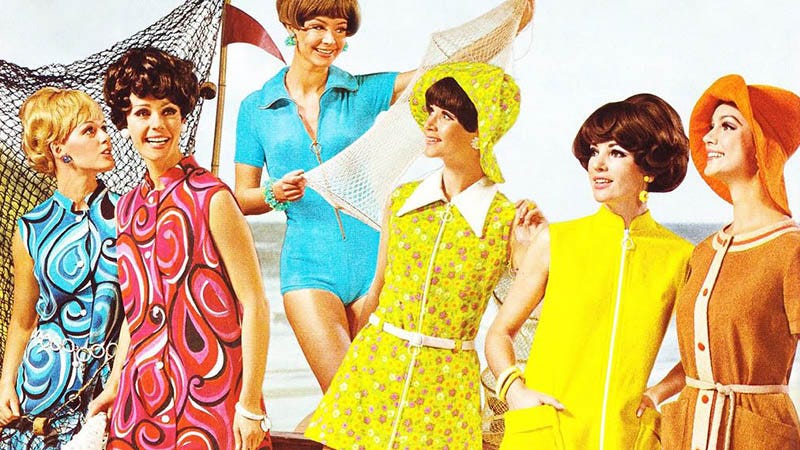
The 1960's is marked an era of a number of diverse trends. It was a decade that broke many fashion traditions/rules , mirroring many social movements during this time period.
By this time, the trends of fashion started getting influenced from small pockets of young people as that sector received large media coverage and publicity. This in turn, heavily influenced both- Haute Couture of the elite designers and the mass-market manufacturers. Example- the mini skirt, culottes, go-go boots, and more experimental fashions, less often seen on the street, such as box-shaped PVC dresses and other PVC clothes.
The changing time and influence on fashion was driving to an increase in demand and production of pales, black whites, neon, bold, tie-die, etc. These colors were blended in geometric patterns in materials like cotton, wool, in Crochet technique. Silhouettes also largely dominated this era as they were used as- tubular silhouettes, straight lines, waistless shifts, bell sleeves, trapeze dresses, pencils skirts, mini skirts, hippi (relaxed) clothing etc.
The major influencers of fashion were still the United Kingdom and America and the trends in men's fashion in these places could be seen in the slim fitting single breasted continental style suits and skinny ties. The fashion icons for this era were Jacqueline Kennedy, Sophia Loren, Jean Shrimpton, Twiggy, Veruschka and for men Sean Connery as James Bond majorly influenced the fashion. Though women's fashion was largely influenced by Jackie Kennedy from the start of the decade till the end. From Modest to "there is no such thing as too short," everything revolved around freeing the mind of women and handing over the power in their hands.
The jazz culture was gradually moving towards Rock & Roll and Pop culture and thus saw the rise of bands like The Beatles. There was also a significant rise in Teenage Subculture such as Mod, Rude boy, Black panther, Skinhead and more.
The main highlights of this time frame were the trends set by famous designers who also surprisingly became more know because of the models. The fan following of models made for a market for the designers. Some of these trends include:
- Colored tights-
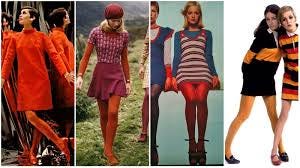
They were also popular in white, black and in purple, fishnet, herringbone or lace. The very idea behind making these tights is rather discriminatory as they were made to cover up ugly knees and didn't cause garter gaps like sheer stockings did.Once pantyhose were perfected they were the savior of women's legs anywhere. They camouflaged hair, bumps, bruises, and wide kneecaps. Even skin tone tights were thick and dark. To go bare legged in the '60s was still too immodest.
2. 1960s Pant Suits-

There was an array of ruckus and confusion over the new pantsuit as it battled equally with "the not too short mini skirts." It was a look directly copied from men's suits but tailored down to feminine proportions. Some work offices and establishments forbade women to wear pantsuits. There was a confusion over whether they were an insult to femininity or empowerment for women (and that it disrespected men). Women read all about them in the magazines and flocked at stores in masses to buy the pantsuit. Surely a talk of the town!
3. Shift Dresses-
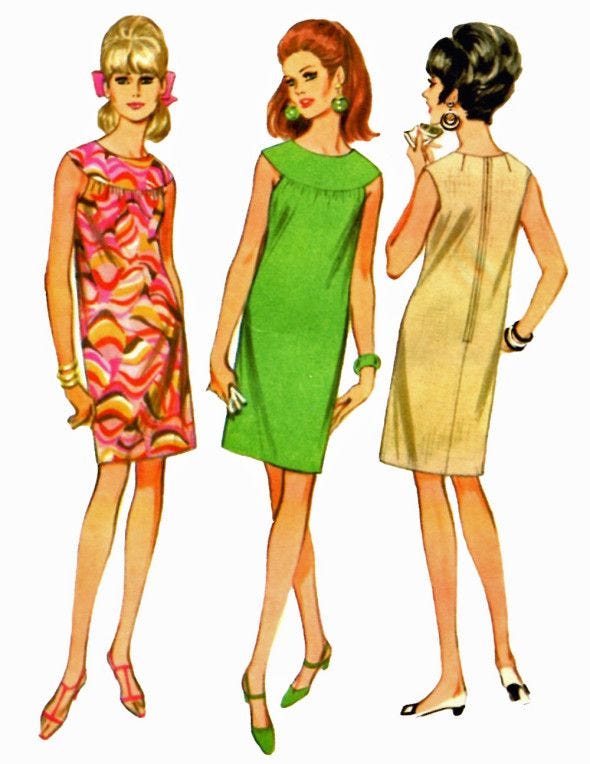
Shift dresses were casual wear for home, running errands or going to the beach. They were not office friendly. Since they were too short, they weren't considered office friendly. 1960s dresses became shorter and shorter. How short a woman's dress was became a sign of how confident she was barring the necessity of having great legs. Hem length was directly proportional to how women felt about their own sexual liberation. Short skirts were not meant to attract men for the sake of sexual interest, but instead were a way to attract attention so that a WOMAN could be the one to decide if his attention was wanted. Sexual power through fashion. The jumper dress was a Mary Quant invention that captured the youthful, playful, side of 1960s fashion. That style immediately made a 20-year-old look 10, a welcome change from the'50s mature fashion. Big bows, large round collars, pastels, and polka dots were all dress details that made women look like little girls' dolls. The more innocent the better.
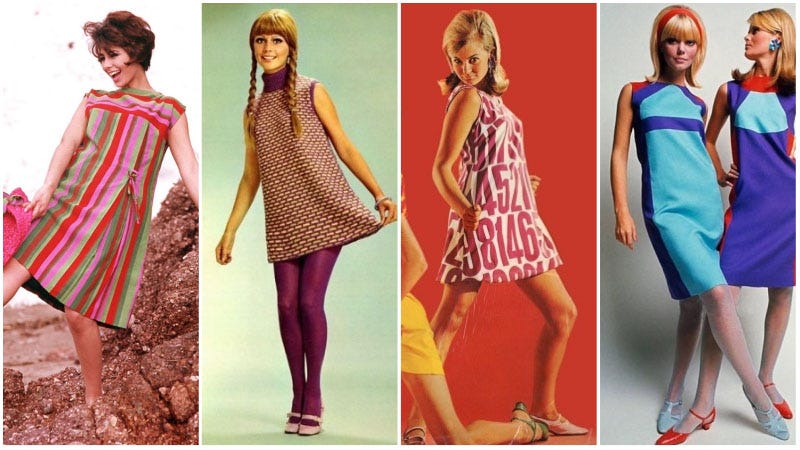
4. THE GO GO BOOTS-
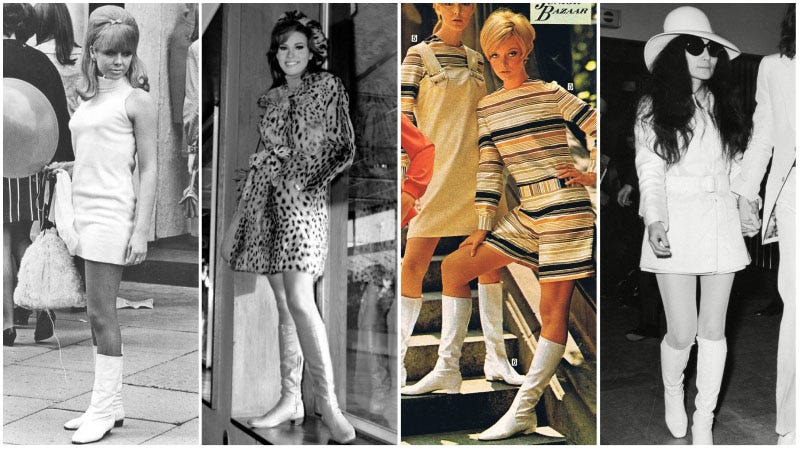
Go-go boots are an iconic '60s footwear style. This wasn't the first time that white shoes came back to the racks. Traditionally white, these shoes were introduced in the middle of the decade staring a classic boot look with low heels and high up till right under the knees. However, over time, the term has grown to include a variety of similar styles, including knee-high versions, other colours and kitten-heeled designs.
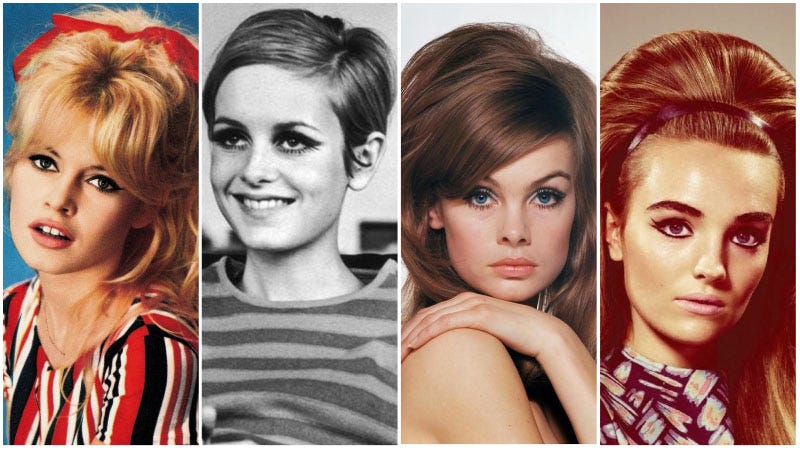
HAIRSTYLES- are the first accessory to an outfit. A complimenting hairstyle can void the need to have jewelry on. The most famous and trending hairstyles of this period were:
WOMEN-
- Beehive Hairdos were famous in the early part of the decade.
- Very short styles popularized by Twiggy and Mia Farrow.
- Very long straight style as popularized by the hippies in the late 1960s.
- The chin-length contour cut and the pageboy were also popular.
- The pillbox hatwas fashionable, due almost entirely to the influence of Jacqueline Kennedy, who was a style-setter throughout the decade.
- During the mid and late 60s, women's hair styles became very big and used a large quantity of hair spray, as parodied in the musical Hairspray.
- Heavy volume made faces appear smaller and more doll-like. Hair length rose from shoulder to chin and cropped above the ears as the decade progressed, only to come crashing down again in the '70s.
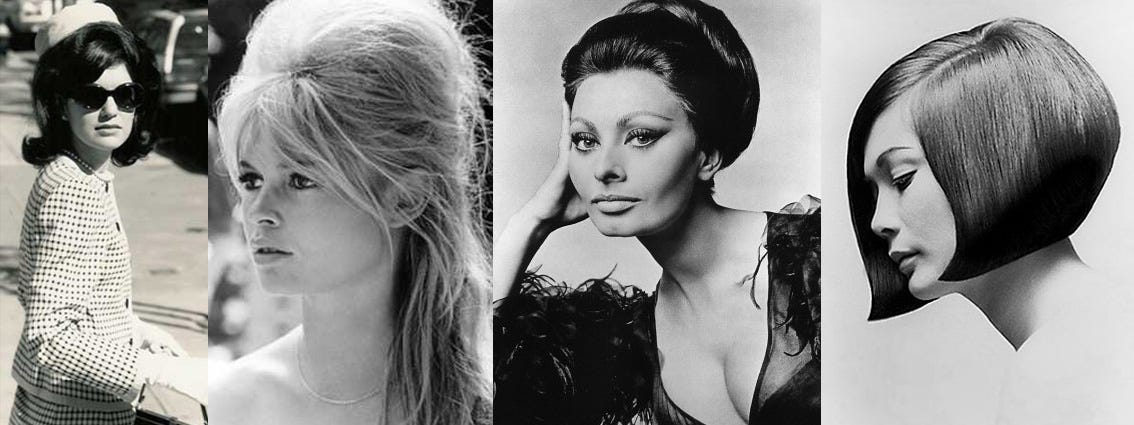
MEN-
- For professional men born before 1940, the side parted short back and sides was the norm in the UK, Europe and America from the early 60s until the end of the decade.
- Black men usually buzzed their hair short or wore styles like the conk, artificially straightened with chemicals.
- Blue collar white men, especially former military personnel, often wore buzzcuts and flat tops during the summer.
- During the early to mid 60s, rebellious Irish-American, Italian-Americanand Hispanicteens influenced by the greaser subculture often wore ducktails, pompadours and quiffs.
- Due to the influence of mod bands like the Beatles or the Rolling Stones, mop-tophairstyles were most popular for white and Hispanicmen during the mid 60s.
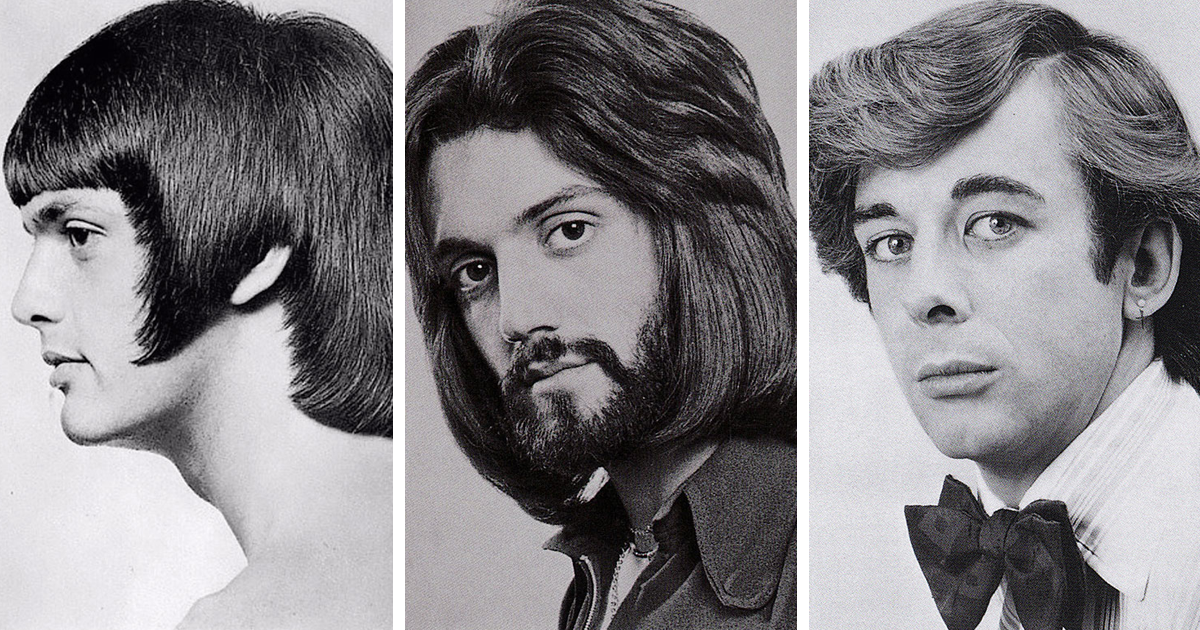
1960s Jewelry-
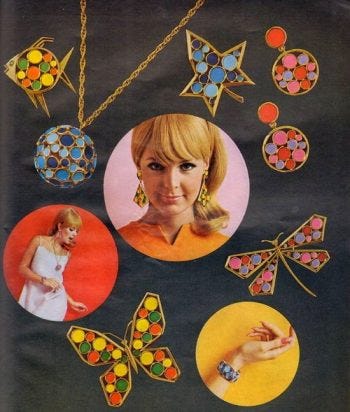
Colorful 1960s clothing needed equally colorful jewelry. In the early years, traditional jewelry continued to favor textured gold, white pastel, and colored pearls. These pretty and safe designs complimented the feminine 1950s style clothing.
During 1960s, jewellery trends changed dramatically. At the beginning of the decade, glamour reigned supreme with glitzy, gold designs and feminine pearls. These bold accessories were influenced by pop art and featured striking designs, geometric shapes and bright colours. Key pieces included large earrings, big rings and bangles.
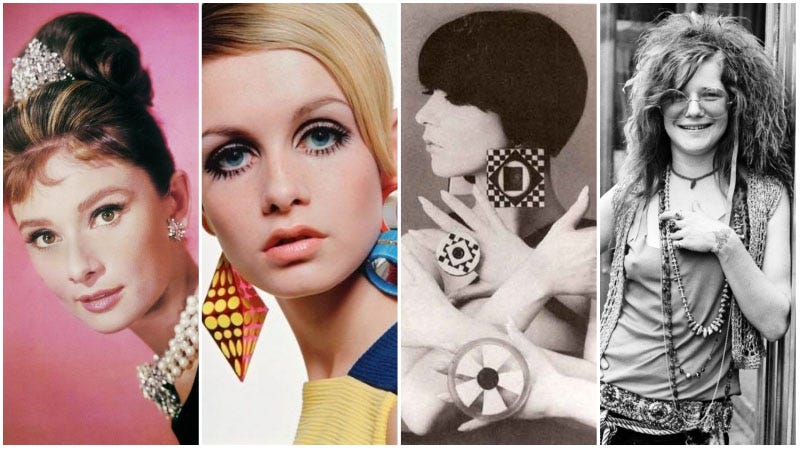
The new youth with their obsession with fake plastics, vinyl, and bold colors favored jewelry inspired by Pop Art. Geometric shapes made their way onto over-sized dangling earrings. Large chunky bangles or stacks of thin bracelets jingled up and down bare arms. Novelty shapes were still popular, but they embraced brighter colors and more comical themes. The same went for flowers, now made from plastic resins. They were cheerful pastel or primary colored clusters hanging from necklaces, earrings and bracelets.
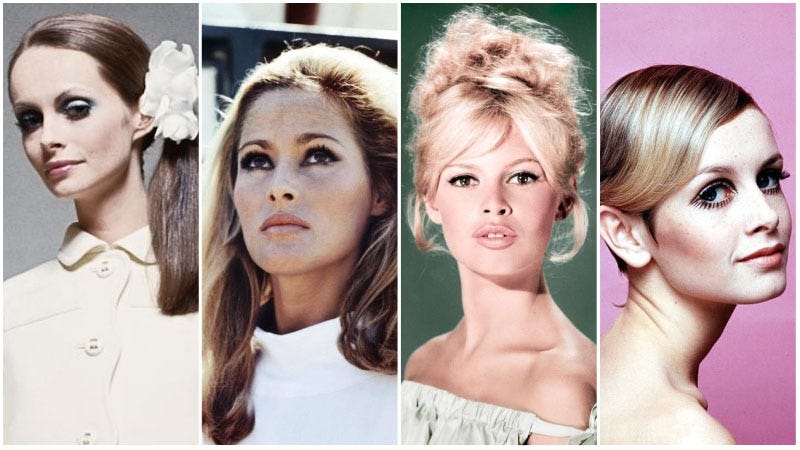
60s Makeup- Big eyes are basic elements of the classic look from the 60'. Paired with pale lips and matte complexions, this look made way for the rather colourful clothing. Thick, winged eyeliner was a prominent look for the decade but that wasn't the only way ladies of the '60s made their eyes pop. Long, spidery lashes à la Twiggy, eyeshadow in cool tones like blue, and bold cut crease makeup were all also popular trends.
POPULAR LOOKS AND FASHION ICONS OF THE 1960-
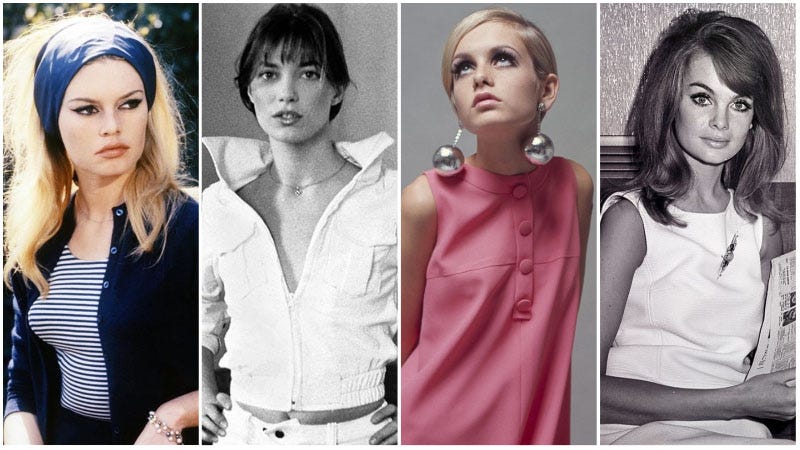
- JACKIE KENNEDY-
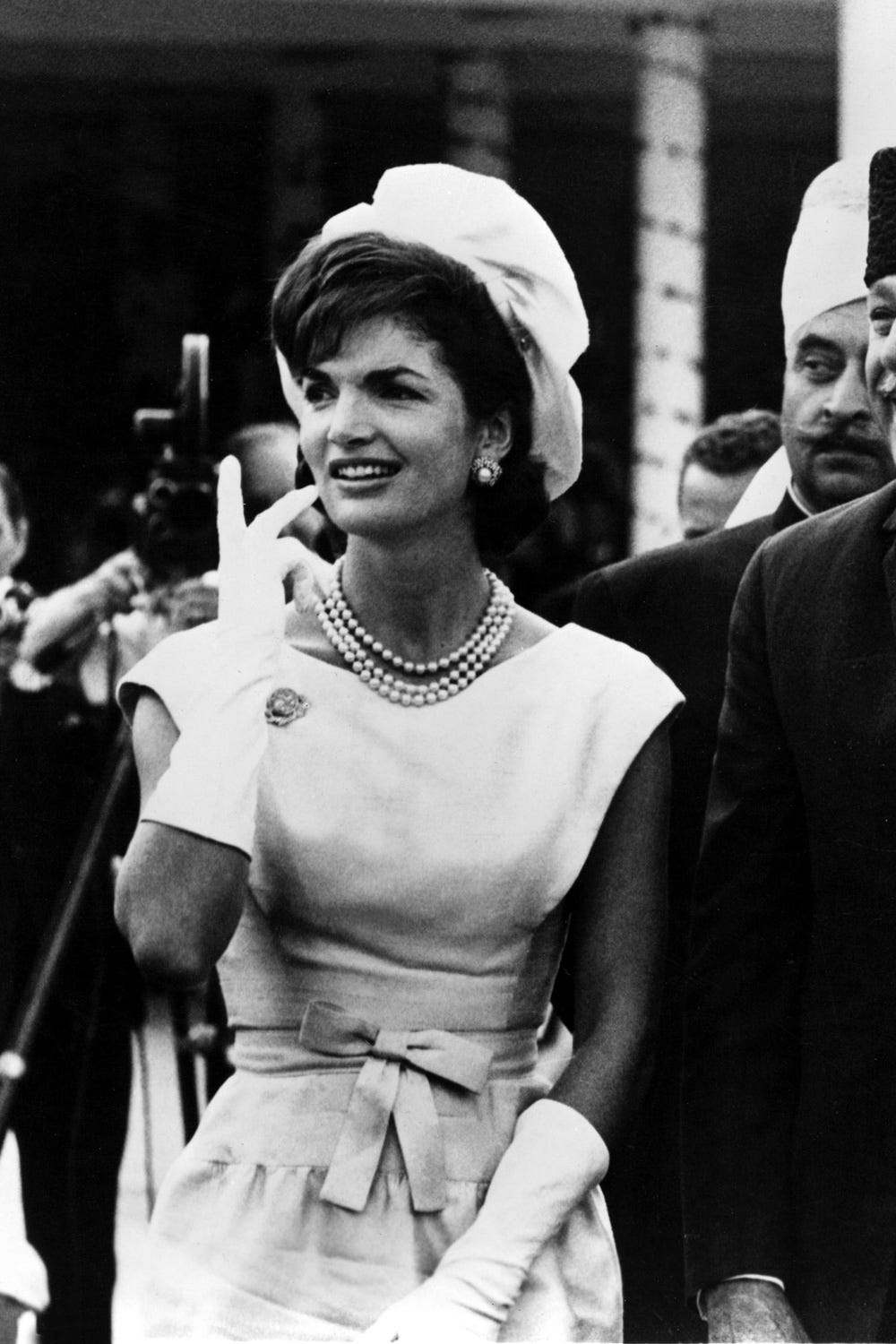
The influence was moving from name of designer to name of model and why not, considering the existence of models like Jackie Kennedy. Her style and fashion statement was one of its kind as she kept it clean, simple, well fitted, with perfectly matched accessories. Her collarless dresses and single buttoned jackets made it elegantly different. Her hats complimented her sensible low heel shoes. Women in the USA and abroad accepted and copied her style with such high enthusiasm that she became the one who couldn't go unnoticed. Before Michelle Obama and Samantha Cameron, there was Jackie Kennedy Onassis. The original fashionable First Lady managed to maintain her impeccable style throughout her time in the White House, even as she lived through tragedy.
Jackie's prim skirt suits, pillbox hats and super-sized dark glasses made her the style inspiration for women across America. The pink suit she was wearing on the day of her husband's assassination has gone down in history as one of the most iconic outfits of all time, and is a staple 1960s fashion look. Jacqueline Kennedy.
In addition to the pillbox hat, women wore suits, usually in pastel colors, with short boxy jackets, and over-sized buttons. Simple, geometric dresses, known as shifts, were also in style. For evening wear, full-skirted formal gowns were worn; these often had a low decolletage and had close-fitting waists. For casual wear, Capri trousers were the fashion for women and girls.
2. TWIGGY-
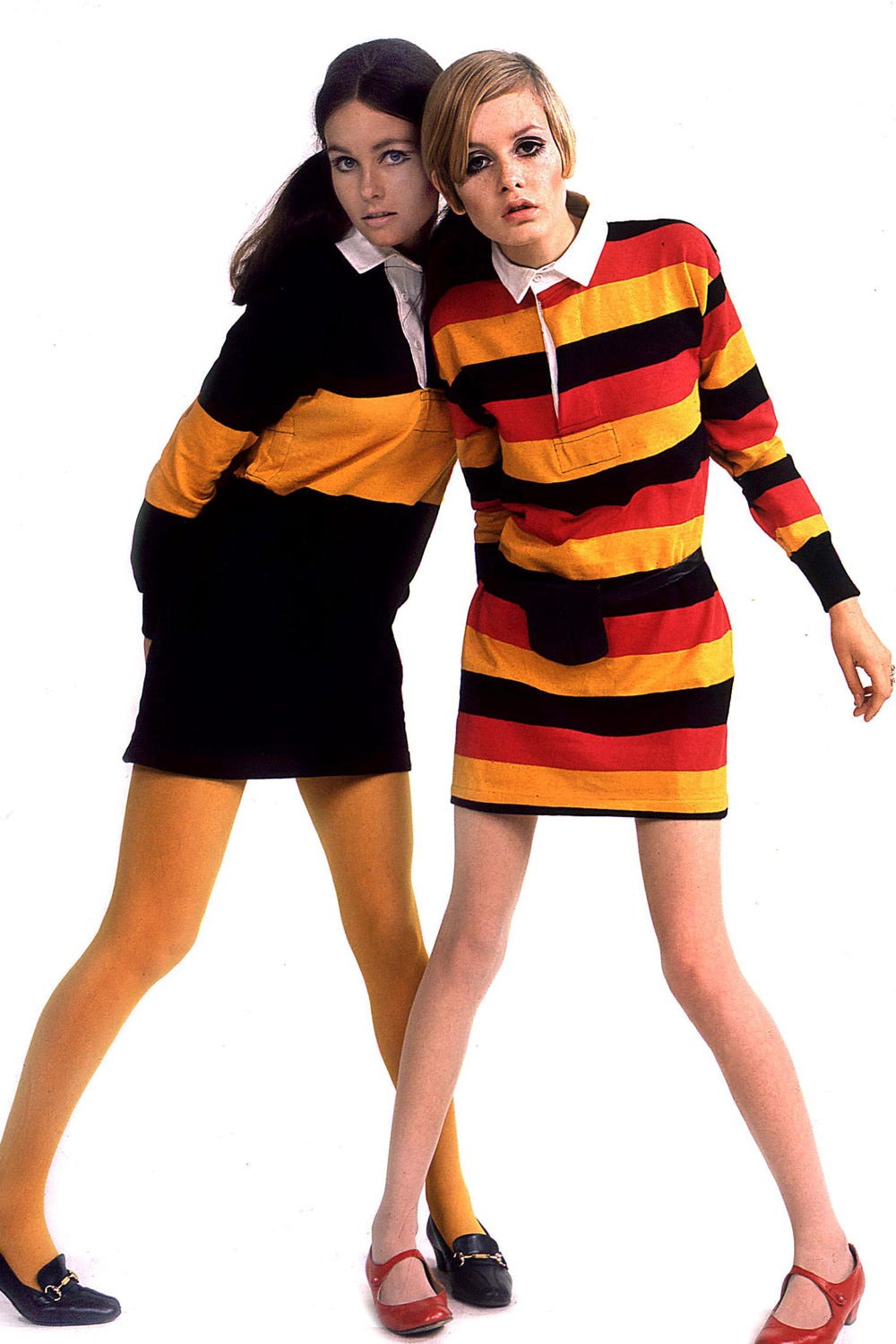
None of the 1960s fashion round-ups would be complete without mentioning Twiggy, who's real name was Lesley Hornby. Bob hairstyles were huge for 1920s fashion, but this girl cemented an even short hairstyle's place in history — the pixie crop. One of the greatest muses of all time, Twiggy quickly rose to supermodel fame, thanks to her paint 'em on thick eyelashes and the boyish style celebrity hairdresser Leonard chopped for her in '66. Almost overnight she became the face of the decade; instantly recognizable, she's been immortalized on everything from Andy Warhol screen prints to M&S shopping bags.
3. MARY QUANT-
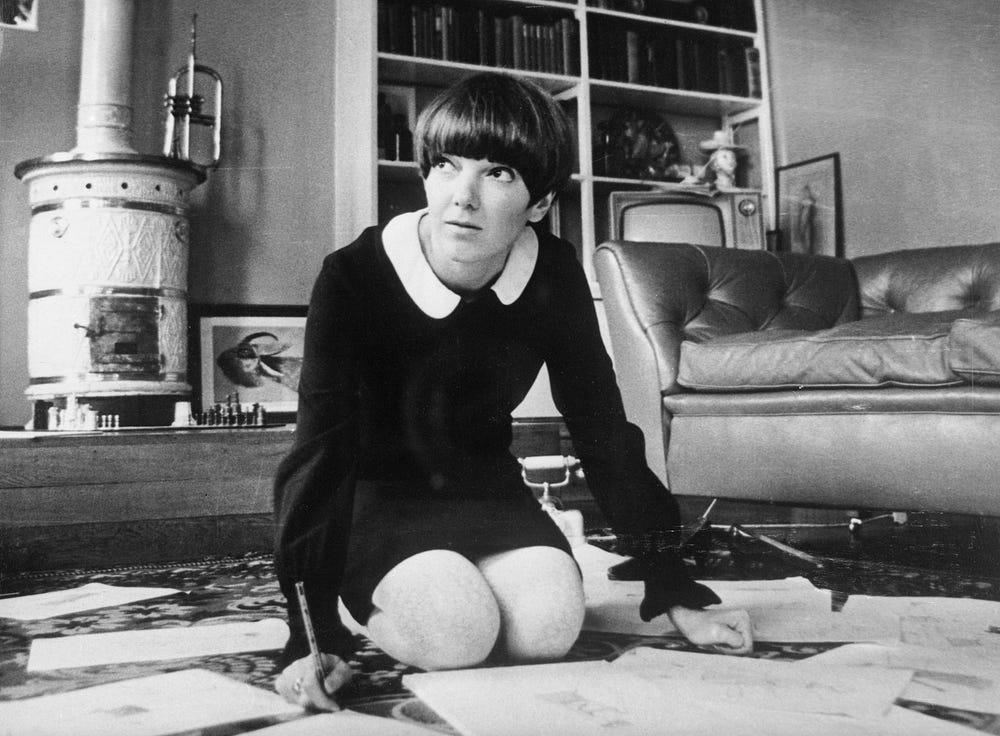
Not only was Mary Quant a 1960s fashion icon in her own right, she brought the era's greatest trends to the wardrobes of the masses from her shop on the King's Road. The mini skirt, hot pants, colored tights and plastic macs — we owe them all to design pioneer and epitome of sixties style, Quant.
Mary Quant was one of the greatest 1960s fashion influence. Her style moved away from "grown-up fashion" to playful "youth" driven fashion. Her shift dresses were very short, and her prints were bold and colorful "mod" prints. Her fashion, her personality, set the tone for the rest of the 1960s as "fashion-is-fun." It was the whole idea of a return to youth that drove most of the fashion in the 1960s. Oversize collars, bows, and delicate trim miniaturized women and made them appear smaller.
Shapeless mini dresses emphasized a woman's natural form. Starting with designer Mary Quant who is credited with the invention of the iconic miniskirt (designed in response to the youthful, fun-loving attitude that was spreading throughout the country), the capital became known as "Swinging London" and soon brightly colored streamlined fashions were all the rage in Europe and America . By 1966 Mary Quant was producing short waist skimming mini dresses and skirts that were set 6 or 7 inches above the knee.
Quant found London girls seeking newness only too willing to try her new daring short mini skirt and the fashion trend took off because it was so different, and to wear which, you had to be youthful to get away with an outfit that was so controversial, particularly among adults. The Quant style was soon known as the Chelsea Look. The shapes Quant designed were simple, neat, clean cut and young. They were made from cotton gabardines and adventurous materials like PVC used in rain Macs. They almost always featured little white girly collars. Truly the designer of her time.
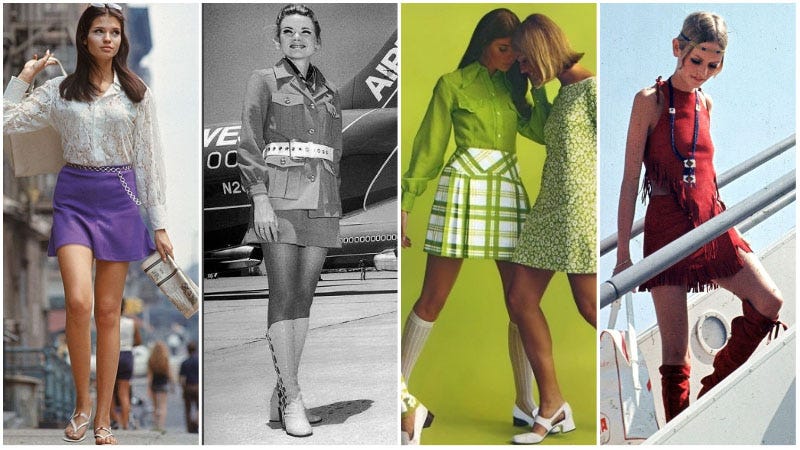
4. THE SINGLE GIRL LOOK- The second-wave of feminism was getting its start during this period: pushing for a new feminine ideal to be capitalized on. Writer, Helen Gurley Brown, wrote Sex and the Single Girl in 1962. This book acted as a guide for women of any marital status to take control of their own lives financially as well as emotionally. This book was revolutionary since it encouraged sex before marriage; something that was historically looked down upon. With the high success of this book, a pathway was set for media to also encourage this behavior. Fashion photography in the 1960s represented a new feminine ideal for women and young girls: the Single Girl. 1960s photography was in sharp contrast to the models of the 1920s, who were carefully posed for the camera and portrayed as immobile. The Single Girl represented 'movement'. She was young, single, active, and economically self-sufficient.
This ideal- single girl needed to be significantly bold, independent and most of all professional. These elements were a highlight of this look as models and photographers came together to shoot in a story telling manner. They made models walk in the outdoors representing the latter. Models in the 1960s also promoted sports wear, which reflected the modern fascination with speed and the quickening pace of the 1960s urban life. This directly implemented the idea a common market place. Women from all economical groups could be seen shopping under the same roof.
5. VERUSCHKA- Shot by Avedon, Irving Penn and Helmut Newton, Veruschka is the splashy German model who landed her first major magazine cover in 1963. All legs, eyes and lips, she exuded sex appeal and lead style in a new direction for 1960s fashion, by pioneering a new 'skinny chic' ideal.
6. BABYDOLL LOOK- "Baby doll dresses of 1966 were full and flared into tent shapes mostly with cutaway armholes or/and a halter neck. They were made of transparent tulles, lace or chiffons plain or tree bark mounted over a matching lining or could be made of crinkled cotton crepe fabrics. Lace of all types from Broderie Anglaise to Guipure to with crocheted effects over colored linings or flesh toned linings were often seen. Black polo neck sweaters made popular by the Beatles cover album were often worn under check pinafore dresses. The dresses were usually solid colors of red or purple wool material. Black and white was a sixties combination and was used in art dresses and block pieced dresses worked in Mondrian style. Black patent accessories complimented all these combinations. One of the easiest ways to get the sixties look was to wear short little colored gloves with a hole cut out to reveal the back of the hand."

These elements not only define a look but also suggest in all places the resemblance to majorly all famous styles that have been mentioned in this article. The look, thus, is an overall representation of a decade as a whole.
Swimwear, particularly the bikini became smaller than one's seen earlier. This was then revolutionized by a German designer- Gernreich who allegedly designed as a symbol of women's liberation — as he himself stated, "…in fashion, as well as every other facet of life." The topless swimsuit would soon lead to the topless dress, and also give birth to another revolution, the 'no-bra bra' which would bring upon quite a change to the fit of clothes and was somewhat more acceptable in public. Although the mini dominated for the most of the decade, women sometimes needed a practical alternative smarter than jeans that could be worn day or evening. Quite formal trousers worn with a tunic, shirt, skinny rib or matching suit jacket were acceptable in certain work situations and liked as alternative evening wear when made from slinkier materials. Trousers were made from Courtelle jersey, cotton velvet, silky or bulked textured Crimplenes, lace with satin, and Pucci style printed Tricel.The '60s also gave birth to the skinny jeans, worn by Audrey Hepburn, which again became popular with young men and women in the first decade of the 2000s. The late 1960s produced a style categorized of people who promoted sexual liberation and favored a type of politics reflecting "peace, love and freedom."
7. AUDREY HEBURN-
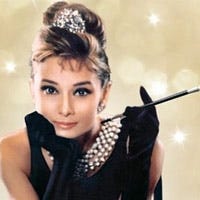
Bringing back a design that was long forgotten is the art of a true fashion legend. Audrey did the same when she brought back the little black dress on the fashion map after her appearance of the same in the 1961 Breakfast at Tiffany's. The next to follow was the top handle bag and movie star shades. There was nothing she would put on that didn't go for a home run. Costumes dominated evening wear, complete with matching jacket or wrap. Later in the season the long, tweed dinner coat was showcased in several high-fashion collections. 1962 mostly focused on 3 styles:
1.) Sleek and slender
2.) softly bloused with muffled neckline
3.) "natural" outline, which fell in a simple, form-fitting line
Greater choices allowed women to express their individuality.
8. Late 1960s Fashion: The Hippie Look-

Anti fashion, as the name suggests is the opposite of the trends accepted by the fashion world. In the case of late 60's, the term Anti fashion couldn't possibly define the hippie culture as it became a fashion style in itself. Where opposites had already existed in the early and mid 1960's the end was yet another. This look starred the faded denim jeans, basic and boring t-shirts, The flower child decorated patches, painting and studding etc. A strapless undershirt and denims were the major highlights. Forest green with brown suede, sunshine yellow with denim blue were signature colors of the hippie '60s.
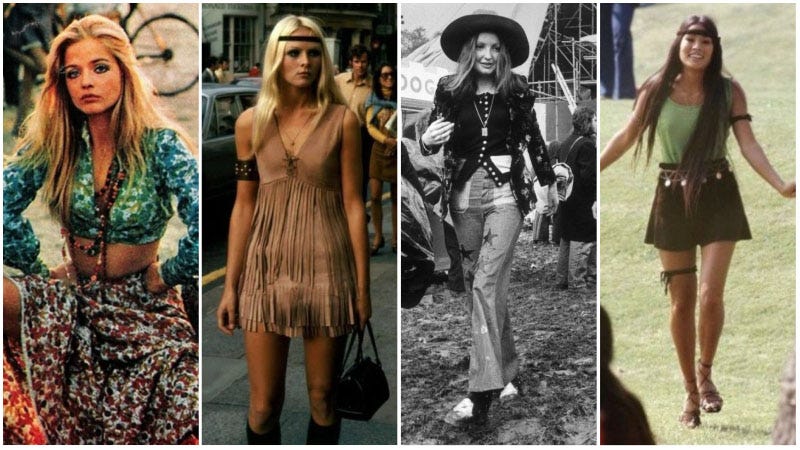
9. Mod Fashion- As London was the epicentre of this period's fashion trends, the Mod Fashion that started in London in 50's, spread around the world throughout the 60's. Widely known as the "London Look," it made an enduring impression that lasts till date. It mainly revolved around modern designs, bright colours, and raised hemlines and thus remains a youth favourite.
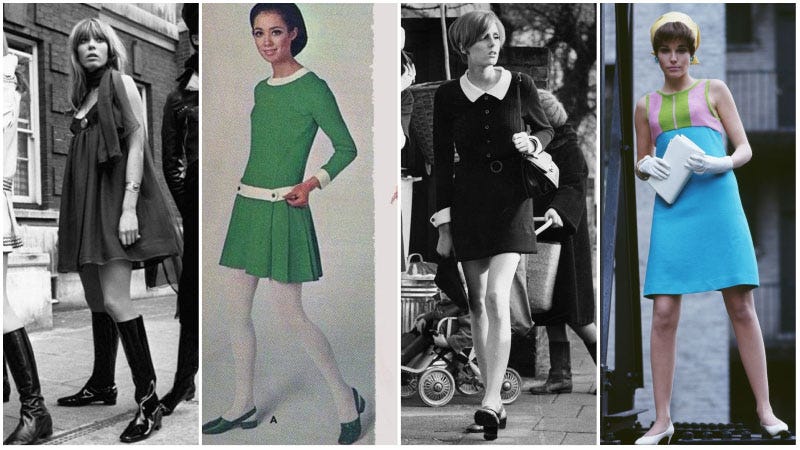
10. Beatnik Fashion- Young individuals followed the likes of of 1950's as they were not yet ready to get over the arts, literature, poetry, jazz music etc. This kept the Beatnik or the beat generation alive until mid 1960's. Their unofficial uniform consisted of black turtlenecks and trousers, berets, and striped tops amongst other items.
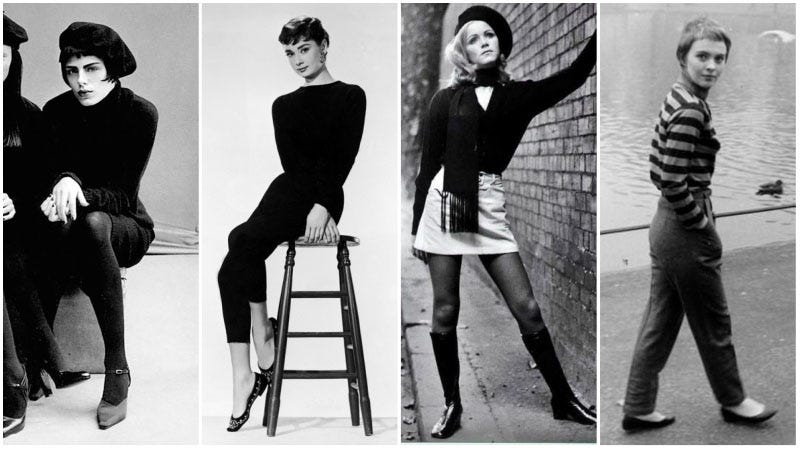
1960s Fashion can be summarised as-
- Jackie Kennedy, Brigitte Bardot, Mary Quant were fashion icons
- The Youthquake movement created "Babydoll" clothing
- Short, shapeless shift dresses in pastels or bright colors
- Button down shirts, turtlenecks, chunky knit sweaters
- Mini skirts or pencil skirts in plaid
- Jax pants, stirrup pants, bell bottoms, pantsuits
- Low heels flats, boots and shoes made of vinyl
- Stockings or tall socks in all colors
- Pop Art Jewelry
- Short bobbed hair or long straight hairstyles
This summary can be used to conclude a definition for the 1960's fashion as- The decade of coexistence of opposite trends that were set by role models.
Bibliography-
Images for 1960s women's fashion
According to victorxenialondon.com
1960s Fashion for Women & Girls | Styles, Trends & Photos — RetroWastehttps://www.retrowaste.com/1960s/fashion-in-the-1960s/1960s-fashion-women-girls/
1960s Fashion Icons: Meet 25 Women Who Shaped The Swinging …https://www.victorxenialondon.com/1960s-fashion-icons-meet-25-women-shaped-swi...
Take a Look at These 1960s Fashion Icons | Who What Wearhttps://www.whowhatwear.com/it-girls-1960s-style
2481 best 1960s Fashion images on Pinterest in 2018 | Vintage …https://in.pinterest.com/vintagedancer/1960s-fashion/
1960s Fashion — Styles that trended in the 1960s — FiftiesWebhttps://fiftiesweb.com › Fashion
Images for 1960s hippie fashion
1960s Hippie Fashion — Women's Fashion — LoveToKnowhttps://womens-fashion.lovetoknow.com › … › Fashion Tips for Women
Hippie Style — Fashion History | LoveToKnowhttps://fashion-history.lovetoknow.com › Fashion History and Eras
1960s Fashion: What Did Women Wear? — Vintage Dancerhttps://vintagedancer.com/1960s/1960s-fashion-womens/
60's Costumes, 60s Outfits, 60s costumes, 60s Fashion,60's … — Funwirkshttps://www.funwirks.com › Decades › 60's Costumes
Knee High Socks Short Nini Dress Button Up Shirt
Source: https://medium.com/@kalyanii8927/fashion-history-the-look-of-the-1960s-292958b78951
0 Response to "Knee High Socks Short Nini Dress Button Up Shirt"
Publicar un comentario